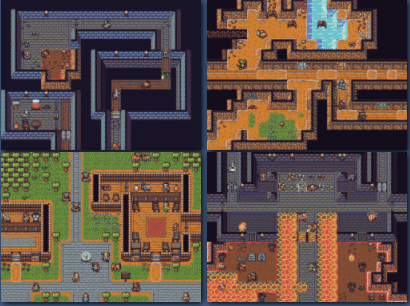More thoughts on the design of Rogue like
 Sometimes I walk up around 3:00 AM and my mind is abuzz with things like this. Last night was one such night. The first thought was I should stop calling it a Roguelike. There’s a certain set of conventions with those and I don’t want to be limited by that.
Sometimes I walk up around 3:00 AM and my mind is abuzz with things like this. Last night was one such night. The first thought was I should stop calling it a Roguelike. There’s a certain set of conventions with those and I don’t want to be limited by that.
For instance here’s an article about things you should or shouldn’t do in designing Roguelikes.
The game (for the next Ebook) is not going to be an all singing all dancing version but will be an MVP in the parlance. That’s Minimum Viable Product,
So if I’m going to divert away from the ‘standard’ then it needs a name. Something evocative like Dungeon Trawler but shorter more catchy. So I’m going with V.O.R. (Vaults of Ruin) or maybe just Vor,
So onto design aspects. Here’s a list of the features:
- 10-15 different Monster types with differing melee, range weapons and magic. Can have packs of them, not just one. There is only one player. Should be fun!
- Simple set of castable spells using a Mana value. It is used up casting spells but regenerates slowly as you move. It can be replenished quicker by consuming potions.
- No food or water but the character has an energy rating. This is depleted by movement and fighting. Rest or sleep oe rating food replenishes it but I don’t want it to be a major thing. I’m not having deep dungeons with 25 or more levels, but 12 levels maximum.
- Weapons are sword, dagger or bow. Can switch between them.
- A few powerful magical treasures.
- Turn based not real-time. Asteroids is real-time but movement will be restricted to so many squares for you and monsters. You probably won’t be able to outrun the faster moving monsters.
- Limited visibility can make things interesting. It means the game has to calculate what squares are visible each move.
I was tempted to do away with grid movement; for instance in the Asteroids game, they can move at any angle and velocity and are not tied to a grid. But that might be a bit too complicated so movement will be grid limited and Up/Down, Left/Right and maybe diagonal.
The screenshot is from an open source (.NET Core/C#) web rogue game called Unicornhack.

 It’s not really a thing done in C, although you could do. I came across
It’s not really a thing done in C, although you could do. I came across 


 The original rogue used graphics. This was back in the era of terminals and home computers and graphics could be quite limited. So there’s a tradition of using text. However if you do a google image search for rogue game like I did here, you can see that while many of them are text there are a couple that are graphics.
The original rogue used graphics. This was back in the era of terminals and home computers and graphics could be quite limited. So there’s a tradition of using text. However if you do a google image search for rogue game like I did here, you can see that while many of them are text there are a couple that are graphics. If you are looking for inspiration for games creation, take a look at
If you are looking for inspiration for games creation, take a look at  The internet archive (yes them again!) not only has archives of most things I’ve done, but they also
The internet archive (yes them again!) not only has archives of most things I’ve done, but they also  This is a 4x game (Explore, Expand, Exploit, Exterminate) . “Select from one of seven races – or craft your own – to explore dozens, hundreds, or even thousands of systems in a galaxy of your choosing. Expand across unique and varied planets and ultimately exterminate – or subjugate – any who stand in your way either in offline single player or up to 28 player multiplayer.” as gog.com put it.
This is a 4x game (Explore, Expand, Exploit, Exterminate) . “Select from one of seven races – or craft your own – to explore dozens, hundreds, or even thousands of systems in a galaxy of your choosing. Expand across unique and varied planets and ultimately exterminate – or subjugate – any who stand in your way either in offline single player or up to 28 player multiplayer.” as gog.com put it.

 The
The